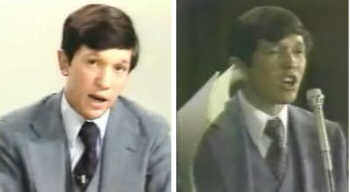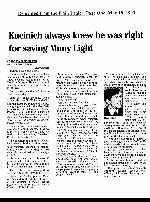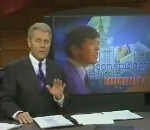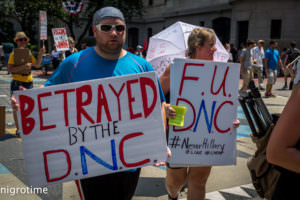The Charge of the Muny Light Brigade
Twenty-eight years ago today, 31-year-old Dennis Kucinich, then the youngest-ever mayor of a major American city, famously pushed Cleveland into economic default rather than capitulate to the demands of a group of bankers eager to gobble up the city's power plant. Today, as Kucinich kicks off his White House bid, he speaks to Truthdig about a stand of integrity that nearly cost him his political career, but which has striking relevance in the current political landscape -- where such integrity seems in short supply.
Editor’s note: Twenty-eight years ago today, 31-year-old Dennis Kucinich, then the youngest-ever mayor of a major American city, famously pushed Cleveland into economic default rather than capitulate to the demands of a group of bankers eager to gobble up the city’s power plant.
Today, as Kucinich kicks off his White House bid, he speaks to Truthdig about a stand of integrity that nearly cost him his political career, but which has striking relevance in the current political landscape — where such integrity seems in short supply.
This interview was conducted by Truthdig research editor Joshua Scheer*.
TRUTHDIG:
Twenty-eight years ago, you were the “Boy Mayor” of Cleveland — the youngest-ever mayor of any major U.S. city. And you were also the first mayor to put a city into default since the Great Depression. What happened there?
KUCINICH: When people find out the nature of the default, they’re pretty shocked. Because what happened is that Cleveland went into default because I refused a bank’s demand to sell Cleveland’s municipal electric system as the price of renewal of the city’s credit.
TRUTHDIG: What happened to your political aspirations because of that episode?
KUCINICH: Corporations aren’t used to public officials who say no. So I couldn’t get a job in Cleveland. I was not able to make a living in this city. It was very tough to win any elected office. But an interesting thing happened: I saved the municipal electric system because I refused to accept this Faustian bargain that was offered me by the city’s lead bank, which was: You sell the city’s electric system, and the bank will give you — the city — $50 million worth of new credit. But if you don’t sell, we’re going to put the city of Cleveland into default. And so this was a moment when I had to determine who I was, what I was made of. Was I ready to take a stand on behalf of the people, or was I just about to become like anyone else who caves in and goes along to get along?
TRUTHDIG: Do you consider yourself a rebel? What made you do this?
KUCINICH: Integrity, clarity, a willingness to see exactly what was going on in the moment. The banks, together with this privately owned utility, which was trying to get a monopoly, with the support of the Cleveland media, had basically decided that the price of the city’s credit was going to be the privatization — or sale — of the city’s municipal electric system to a business partner, with whom the bank had numerous business relationships — including four interlocking directorates.
I was elected mayor of the city of Cleveland on a platform of saving the people’s electric system. My first act in office was to cancel a sale that had already been consummated by the City Council and the preceding mayor. I had blocked the sale with a citizens’ petition drive and ran for mayor while the sale was in limbo. This was a movement which brought me into the mayor’s office; people insisted that they not give up an electric system that provided savings on electric rates of anywhere from 20 to 30 percent, and provided electric utility service to at least a third of the city.
How much people pay for electricity is no small matter. For some people, it is a real hardship to be able to meet the monthly electric bill, gas bill, telephone bill. I remember when I was growing up in Cleveland, standing in a hallway, listening to my parents count the pennies to pay the electric bill. I can still hear the pennies dropping — click, click, click — on our old chipped, white and metal table.
So I was sitting in a board room with the head of Cleveland’s largest bank, Cleveland Trust, and he was telling me that unless I agreed to sell Cleveland’s municipal electric system to the Cleveland Electric Illumination Co., which had many relationships with the city’s banks, he was not going to renew the city’s credit.
And all the time I’m thinking about my parents, back when I was a child. I’m hearing them counting the pennies. I’m hearing “click, click, click,” and this banker is telling me, “You had better sell, or we’re putting this city into default.” And I’m thinking of my folks and everybody like them, to whom it matters what they pay for electricity, to whom it matters that there’s somebody standing by, defending their interests — even if they don’t know about it. For me this was a moment that brought together everything I ever believed in.
TRUTHDIG: Did the press vindicate you? Does the municipal power system right now have a lower rate than the privately owned one?
KUCINICH: It’s still competitive. The answer to the first part of your question is that 15 years after I refused the bank’s deal to take Muny Light off the hands of the city of Cleveland, Cleveland Municipal Electric System undertook the largest expansion of any municipal electric system in America. It had saved the people of Cleveland hundreds of millions of dollars in lower electric rates and also in tax dollars, by providing electricity for street lighting and for city facilities. And this year, 2006, Muny Light, now called Cleveland Public Power, observed its 100th anniversary.
I take great pride in [having been] mayor at a time when this enormous effort was made to push the city of Cleveland to sell the electric system. It was on my watch. I had to make a decision. I had to decide if I was going to knuckle under to the wave of media coverage that, one editorial after another, one news story after another, basically reconstructed the social and political reality of the city to make it seem like I had no other alternative but to sell the electric system.
But there are times in one’s life when you have to realize the illusions which surround you; you have to be able to pierce that unreality and to understand exactly what’s going on in the moment. And I understood what was going on in the moment. And when I saw things that were not true, I called them like that. And so I had to let the people know, “Look, there’s no reason the city of Cleveland should have to go into default.”
We went into default over $15 million. In a city like New York, I suppose that would be the cost of some department’s stationery budget. And yet it was about an effort to take away something that belonged to the public. And so here I am: America’s youngest mayor, with one of the most powerful banks in America, and one of the most powerful utilities in America, backed by the entire business establishment, backed by the media, backed by a number of community organizations, and they’re all saying, “Sell, sell, sell.”
The message was coming from all directions. I was told that I had no other choice but to sell. And it was all based on a hoax. It was a fraud. It was a moment when I was called upon to have foresight and clarity and take a stand, and let the chips fall where they may.
And I’ll tell you something: I knew at that moment, I knew absolutely, that my career was on the line. I knew that if I refused to sell, the banks would put the city of Cleveland into default and I would likely lose the next election because people wouldn’t understand what happened. But any of us have to decide at some point in our lives what we stand for — whether we have integrity, whether we really believe that there is such a thing as a government by the people, of the people and for the people. TRUTHDIG: When the chips fell, they fell pretty hard. You were forced out of public life for nearly 20 years. In hindsight, do you stand by your decision to do this?
KUCINICH: Every public official or aspiring public official who would read this interview should remember that when you take a public trust, the most important thing is to defend the public interest. There’s always some kind of a deal out there where someone is out there to convince you that if you just go along with this particular matter, it’ll be good for your career; it’ll show people that you know how to come to reason. Deals like Muny Light are out there every day for politicians who want to get in with certain interest groups, who want to advance their career. This isn’t condemnation of people who do it, but that’s just so much of what politics is about: People decide, “Well, I’m going to do something I really don’t like, but I’ll stay in office and I’ll be able to help people some other time.” There are millions of little bargains that take place like that every day. It’s just that I saw something else: I saw that this had immediate economic relevance for the people of Cleveland, and also for everyone who was ever in public life who felt like they needed to take a stand and were looking for the courage to do it.
Because any one of us can inform all of us that it’s OK, that life is going to go on, that you can stand up for what you believe in, that you don’t have to sell out, that you don’t have to sell your soul, that you don’t have to let someone else determine the circumstances under which you are in public service.
So this was a wonderful opportunity for me, having been the youngest mayor of the city of Cleveland, who had this chance to stand up for the public interest — at a critical moment, when everything was on the line, and all the odds were stacked against me … I stood up for the people.
And years later they knew I was right. Years later they put me back in the state Senate, and they followed up by putting me in Congress, and I win elections in Cleveland now by huge majorities. And I’m grateful for that. But I knew in 1978 when I refused to sell that electric system, I knew the bank was going to follow up on its threat to put the city of Cleveland in default. I also knew I’d lose the next election — which I did. But there are, believe it or not, some things more important than holding public office. And what’s important is that when it comes your turn to make the decision, you stand up, you don’t relent, and you — in the words of “Prometheus Unbound” by Shelley — you defy power which seems omnipotent. And that is what it means to be joyous and free. If you are going to want to be a torchbearer for the freedom of the people, you have to be free yourself.
TRUTHDIG: There’s a lot of debate over the regulation and deregulation of energy companies. But this was not really a deregulation-regulation debate, right? You were trying to prevent a monopoly.
KUCINICH: Right. This was an issue of: Do the people have the right to own their own utility? The question is: Is there such a thing as the public domain? Is it appropriate for governments to operate water systems, sewer systems, parks, libraries, public services? The man who founded Muny Light 100 years ago, Mayor Tom Johnson, said something to this effect: I believe in the public ownership of all municipal service utilities, because if you do not own them, they will in time own you. They will rule your politics, corrupt your institutions, and finally destroy your liberties.
The issue of public ownership has huge implications today for the people of the United States:
It relates to whether or not we can have a public retirement system like Social Security, which has been under attack in a privatization scheme.
It relates to whether or not we can have a public health system through a universal single-payer system instead of this system we have today, in which 100 million people are either uninsured or under-insured, because the system is held by private interests.
It relates to the question of whether public education is going to be adequately funded.
It relates to the theft of natural resources — of oil companies using their power to get leases and mining companies using their power to grab public lands, or everyone looking at public resources as something to be looted.
This same destructive impulse is evident in the policies of the International Monetary Fund — the so-called structural adjustment policies, which force communities to give up publicly owned assets in order to gain access to capital, and then the people end up paying exorbitant amounts of money for services which used to be provided directly to the people.
This question of public control was at the center of Dwight D. Eisenhower’s farewell speech, where he said to beware of the military/industrial complex. Today we see the privatization of war reflected in mercenaries and contractors in Iraq, who will make of the war in Iraq a perpetuating industry.
It relates to this destructive ethic of privatization, which is being visited on the people of Iraq right now, with the attempt by interest groups to push changes in national law which pave the way for the privatization of the oil industry.
These are the kinds of questions that are central to issues of democratic governance. These are questions that are central to the very idea of a polity which exists for the public interest, as opposed to the private interest. So go all the way back to Dec. 15, 1978, and my decision had implications far into the future. And I can see the same kinds of schemes that are out there today that try to steal or defraud the public of what is really a heritage of the people. And for my part, what I learned in Cleveland in 1978 is that it is possible to stand up; and you may pay a price, but what is the most important thing in life is the triumph of principle; and nothing, no high office, no monuments, no false praise from media working against the public interest, is a substitute for being at peace and one with integrity.
TRUTHDIG: Thanks for shedding light on this; because when you read encapsulations of your public career, you usually only read that you ended your mayorship in controversy.
KUCINICH: When people look at the issue of default and they connect it with my name, they should also connect with my name a “Not for Sale” sign. They should connect with my name the essence of public power.
*Truthdig interviewer Joshua Scheer worked as an entry-level staffer on Kucinich’s state Senate campaign and was later a summer associate in his congressional office. In this weekly interview series, Rep. Kucinich gives his take on the goings-on in Congress in the wake of the Democrats’ victory and addresses other matters.
Your support is crucial…With an uncertain future and a new administration casting doubt on press freedoms, the danger is clear: The truth is at risk.
Now is the time to give. Your tax-deductible support allows us to dig deeper, delivering fearless investigative reporting and analysis that exposes what’s really happening — without compromise.
Stand with our courageous journalists. Donate today to protect a free press, uphold democracy and unearth untold stories.











You need to be a supporter to comment.
There are currently no responses to this article.
Be the first to respond.